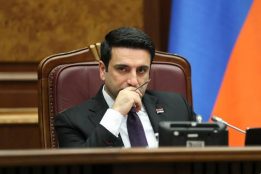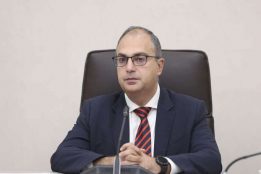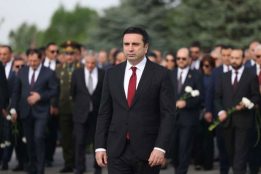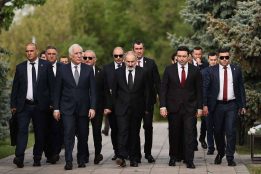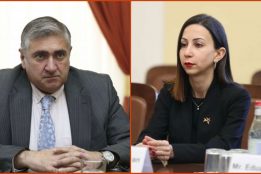
Jamestown Foundation touched upon the possible use of social media in anti-authoritarian regime protests in Azerbaijan. Find the article below.
They’ve battled police in the streets and they’ve challenged authority the courts. Now, faced with staggering increases in fines for unauthorized demonstrations, Azerbaijani opposition activists are turning to Facebook to get their messages out.
A November 10 amendment to the Law on Freedom of Assembly hiked penalties for participation in unsanctioned protests nearly eighty-fold from a mere seven to 13 manats ($9-$16) to a hefty 500 to 1,000 manats ($637-$1,275).
Those charged with organizing such protests would incur far larger fines: depending on the extent of the individual’s alleged role, the punishment would range from 1,500 to 30,000 manats ($1,900 to $38,265). The average monthly salary in Azerbaijan is currently about 388 ($494) manats. The penalties for organizers represent up to a six-fold increase over earlier fines.
Opposition activists predict that the changes will have a chilling effect on civic debate, and may well curb unsanctioned street protests. The new fine framework will go into effect on January 1. Officials explain that the changes are designed to ensure public order. Critics, pointing the fast-approaching presidential election in February, note that authorities have an added incentive in the coming months to keep a lid on public displays of discontent.
“Most of our supporters are young university students, who cannot afford to pay that penalty,” said Tural Abbasli, chairperson of the opposition Musavat Party’s youth organization. Non-payment, he continued, would mean that “the court would go after their property, their houses, which will be such a headache for their families.”
Abbasli, saying he didn’t what to bear responsibility for bringing hardships down upon young activists, indicated that he would feel “very uncomfortable” about advocating street action in 2013.
Other opposition activists agree; the new fines mean greater caution in organizing protests, said Hesen Kerimov, chairperson of the Popular Front Party of Azerbaijan’s Supreme Council. “The majority of our supporters are unemployed because of their political views,” Kerimov claimed. Even for those who have jobs, “their financial capabilities are not at all sufficient to pay the penalty,” he added.
While the government of Baku does allow protests outside the city center, officials make it as difficult as possible for those wishing to participate, opposition leaders say. “[The Baku city government] creates so many obstacles, such as stopping people from walking in the direction of the site of the protest [and] creating intended obstacles for taxis,” said Kerimov, a member of the Public Union, a coalition of various opposition parties and sympathizers which routinely holds protests without city permission. “They leave no option for us.”
With all other protest possibilities seemingly cut off, social media platforms, an increasingly popular venue among Azerbaijanis for debate about political topics, are the only realistic protest option left, noted Abbasli. Official statistics report that 5 million Azerbaijanis – about 54.5 percent of the population – have Internet access. The Facebook-traffic-analysis site Socialbakers claims that 900,000 of them are Facebook users.
Opposition activists hope that a social media-based opposition strategy, given Internet usage numbers and Facebook’s flexibility as a means of communications, will re-invigorate the movement – essentially taking one step back in order to take two forward.
“At the first stage, those people who are observers soon become active in discussions and build trust,” commented Natig Adilov, the founder and administrator of Xilas (Salvation), one of the largest Azerbaijani Facebook discussion groups, with over 200,000 members. “At the next stage, they feel confident enough to have their protests in the streets.”
Abbasli agrees; “Those protests in cyberspace will involve more people, will expand broader and it will not stay there forever. People will move back from cyberspace to the streets. This time more aggressive, more difficult to control.”
Practically speaking, it is no sure thing that voices of dissent will become bolder online than they are on the streets. Officials already carefully monitor Azerbaijani citizens’ web activities, and individuals already have been jailed for reasons related to their online activities.
One American communications researcher who tracks developments in Azerbaijan cautions that moving criticism of the government from Facebook to the streets indeed poses a challenge. As political opponents increasingly go online to mobilize, government monitoring and surveillance will increase, in turn, predicted Katy Pearce, an assistant professor of communications at the University of Washington.
“That could easily discourage online dissent,” Pearce said in an email interview with EurasiaNet.org. “Despite the fact that the Azerbaijani government does little blocking of content, because individuals fear the repercussions of expression online, people self-censor and thus there isn’t freedom of expression online for Azerbaijanis.”
Azerbaijani blogger Ravil Asadov concedes that he often wrestles with self-censorship. “I am being threatened for my blog, which is critical of the government. It does not stop me. But it is annoying,” Asadov said. “Every time I write, I think of censoring myself so that I do not have more headaches.”
At a UN-sponsored meeting held in Baku in early November, European leaders castigated Azerbaijani authorities for their repressive web tendencies. Baku authorities, meanwhile, insist they are tolerant of the Internet’s diversity of views. “The principal position of the Azerbaijani government is to create all possible conditions for ensuring full Internet-freedom,” Elnur Aslanov, head of the presidential administration’s political analysis department, told 1news.az on November 8.
Activists like Abbasli have strong doubts about the sincerity of the government’s statements on Internet freedom, but they add they have no other option than to press on with a web-based campaign, despite the risks.

















